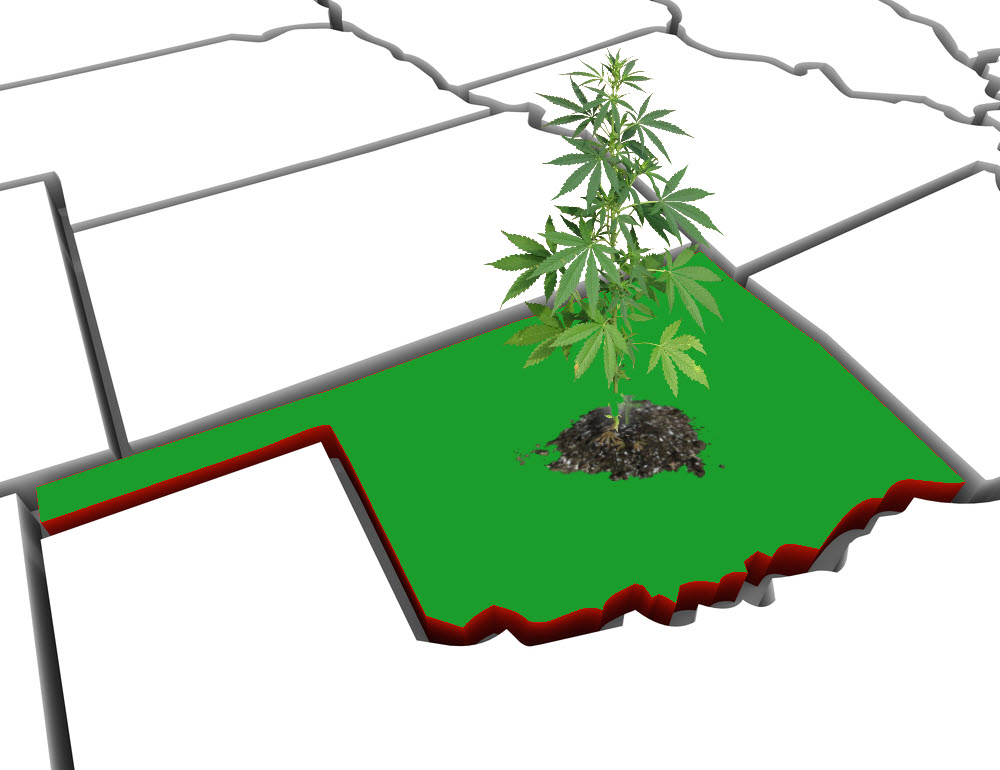
2,600 dispensaries and now adding recreational cannabis, what could go wrong in Oklahoma?
In 2018, State Question 788 in Oklahoma made the recreational use of cannabis illegal, but allowed it for medical use with an appropriate license. However, Oklahoma citizens will vote on March 7 on whether or not to legalize cannabis statewide for recreational use.
The decision is seen as an opportunity to boost local businesses and spur social reform, but some critics fear it could lead to a rise in addiction and substance abuse. If the measure is passed, Oklahoma will become the 22nd state to legalize recreational cannabis use and allow citizens 21 years of age and older to purchase marijuana products from licensed dealers and vendors.
Currently, the Oklahoma Medical Marijuana Authority has responsibility for overseeing the Oklahoma Medical Marijuana program. As a division of the Oklahoma State Department of Health, its primary responsibility is to regulate and issue licenses for medical marijuana. They work diligently to ensure health practices related to medical marijuana are safe and reliable
Marijuana business in Oklahoma
Following the legalization of cannabis for medicinal purposes in 2018, Oklahoma has seen a surge in the number of marijuana growers. The availability of legalized licenses, affordable land, and minimal government oversight has motivated the rise of commercial marijuana cultivation primarily for medical purposes.
Remarkably, marijuana growers have no limitations on the scale of operations. This has resulted in significant revenue growth beyond just supplying medical marijuana to patients. Currently, the state of Oklahoma has issued operating licenses to approximately 2,600 dispensaries and 7,000 farmers. However, there are also some individuals who operate in the industry without proper licensing.
Switching from medicine to leisure
Cannabis legalization activists are actively working towards national legalization. Their goal is to gather enough signatures to get the issue of legalizing cannabis on the state midterm ballot. This movement has gained significant momentum, with residents in various states giving their approval to the initiative by adding their signatures.
The proposed marijuana program will allow people ages 21 and older to legally purchase and possess up to one ounce of cannabis. In addition, adults are allowed to grow up to six cannabis plants for personal use. The Oklahoma Department of Health will be responsible for regulating and issuing licenses to cannabis companies.
The state question 820
State Question 820 is the latest initiative that will be voted on by citizens and aims to introduce licenses for recreational cannabis use. The proposed legislation would allow large farmers, transport companies and processors to operate legally. In addition, the state will issue regulations on production practices and detailed labeling.
A 15 percent tax is levied on every recreational sale, which is double the amount medical users pay in taxes. The additional revenue generated is used for drug addiction treatment programs, student welfare, the state general revenue fund and local governments. While individual businesses and landlords will have the authority to regulate the use of marijuana on their property and during employment, SQ 820 will not affect current medical cannabis laws and regulations.
Likely implications if recreational cannabis is legalized
revenue
A recent lobby-commissioned report urging legalization of recreational cannabis in Oklahoma shows that if passed, the state can expect significant marijuana tax revenues. According to the report, tax revenue from recreational sales is expected to peak in 2027 at over $97 million, while the medical market is expected to generate $69 million. As the market adjusts to a larger customer base and lower prices, these revenues are expected to remain stable beyond 2027.
In addition, the law firm Vicente Sederberg LLP conducted an economic impact and tax analysis that found Oklahoma to generate $821 million in tax revenue over the next four years from both the recreational and medicinal cannabis markets.
employment opportunities
If marijuana is legalized, it would lead to the establishment of dispensaries and nurseries, create new job opportunities, and boost the economy of the cannabis industry across the country. The industry would require workers to grow, distribute, process, and market marijuana products.
Additionally, legalization would allow people to choose between buying marijuana from health card vendors or on the black market, as it would be legal wherever it is sold.
Currently, over 360,000 people, or approximately 9% of the state’s population, are eligible to purchase and possess marijuana for medicinal purposes. If it were legalized, those using it for recreational purposes would not be arrested. Terri White, a former Oklahoma commissioner of mental health and substance abuse services, supports the move, stating that people who use marijuana should not be considered criminals. However, she is adamantly opposed to the legalization of recreational marijuana.
Cons about legalizing marijuana in Oklahoma
The legalization of marijuana has drawn criticism from various quarters across the country. Opponents argue it would create confusion for law enforcement as they try to keep up with changing regulations. In addition, critics claim that drug abuse by young people would reduce property values. Gov. Kevin Stitt shares these concerns and believes the ballot initiative is inadvisable. He notes that marijuana already provides medical assistance to Oklahomans who need it, making it unnecessary to legalize it any further. In addition, he claims that legalizing marijuana harms young people.
Diploma
After much debate and deliberation, Governor Kevin Stitt has called a March 7th statewide election to determine whether or not those over the age of 21 can use marijuana recreationally.
The economic benefits of legalizing marijuana have been seen in other states, with direct tax revenues for the state, the creation of thousands of jobs, and proper regulation of the substance’s production, distribution, and consumption.
Additionally, legalization could potentially ease the burden on law enforcement by redefining what counts as illegal. The decision is in the hands of the people, and only time will tell what the future holds for marijuana legalization in Oklahoma.
OKLAHOMA IS LICENSE HEAVEN, READ MORE…

OKLAHOMA HAS AWARDED 9,000 CANNABIS LICENSES, AND COUNTING!

Post a comment: